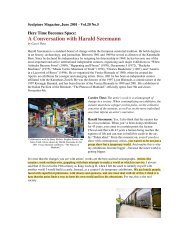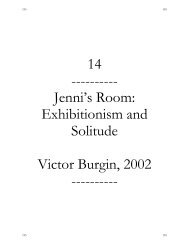Untitled
Untitled
Untitled
You also want an ePaper? Increase the reach of your titles
YUMPU automatically turns print PDFs into web optimized ePapers that Google loves.
Europe and Its Others<br />
In recent years we have been hearing European politicians say over and over<br />
that Europe is not just a community of economically defined interests but<br />
something more—namely, a champion of certain cultural values that should<br />
be asserted and defended. But we know of course that in the language of<br />
politics “something more” as a rule means “something less.” And, indeed,<br />
what European politicians really want to say is that Europe cannot and should<br />
not expand unlimitedly, but should end where its cultural values end. The<br />
concept of culture defines de facto the self-imposed borders of economic and<br />
political expansion, for the scope of the applicability of European culture is<br />
thus more narrowly defined as the area of European economic interests.<br />
Europe will thereby differentiate itself in relation to Russia, China, India, and<br />
Islamic countries, but also with respect to its ally the United States, and at<br />
the same time present itself as an internally homogeneous community of<br />
values that possesses a specific cultural identity to which those who come to<br />
Europe should conform, thank you very much. The question I would like to<br />
raise here is not whether such a differentiation, such a definition, of European<br />
cultural values is desirable or not. Rather, I would like to ask how exactly are<br />
European cultural values defined by European politicians today, and how<br />
successfully Second, what interests me is what effect this demand for European<br />
cultural identity has on the arts in Europe.<br />
The desire to situate one’s own culture in an international comparison<br />
is surely completely legitimate. The question is simply how well this attempt<br />
succeeds in Europe’s case. Now, as a rule, European values are defined as<br />
humanistic values that have their origin in the Judeo-Christian legacy and in<br />
the tradition of the European Enlightenment. European values are generally<br />
thought to include respect for human rights, democracy, tolerance of the<br />
foreign, and openness to other cultures. To put it another way, the values<br />
that are proclaimed to be specifically European values are in fact universalistic,<br />
and one could rightly demand that non-Europeans respect them as well.<br />
Therein lies the entire difficulty that inevitably confronts those who would







